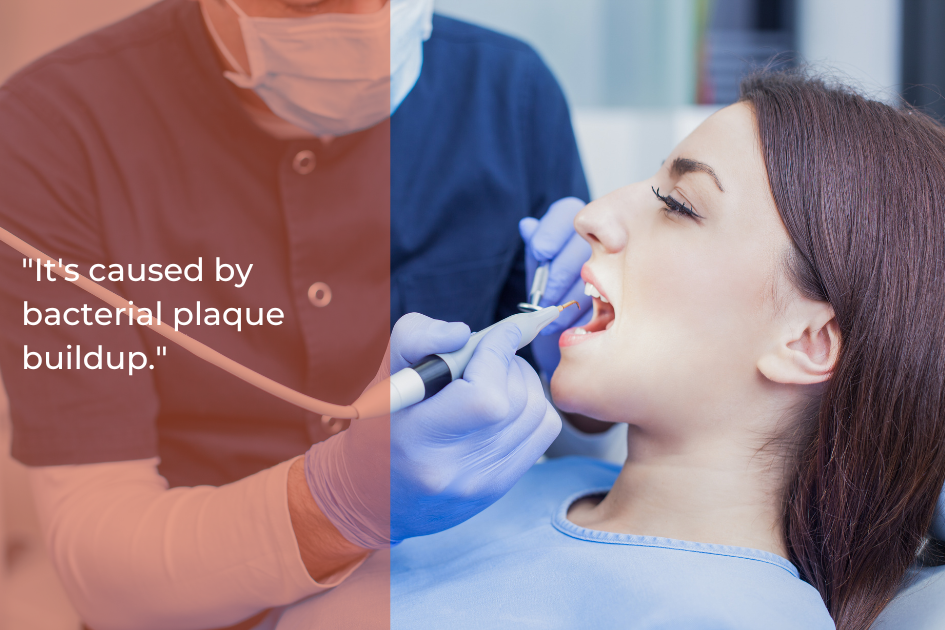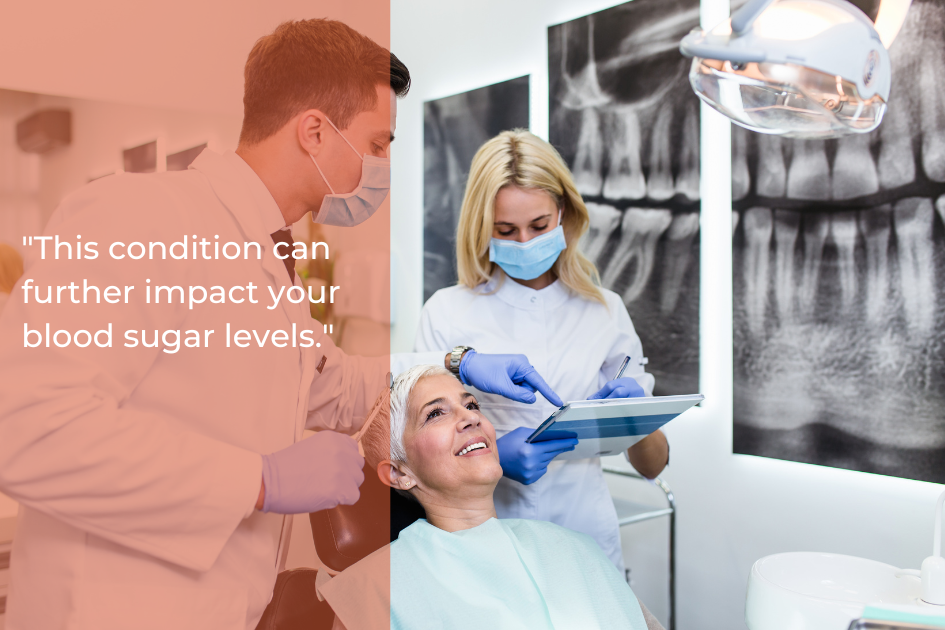We all know that periodontal disease can cause serious problems for our gums, but did you know it can also affect your overall health? This common yet often overlooked condition, if left untreated, can lead to an inflammatory response that may contribute to heart disease, stroke, and even diabetes. It’s not just about inflammation either. Bacteria from our mouths can enter the bloodstream, leading to infections in other parts of the body. So, it’s not just about maintaining a healthy smile anymore; it’s about protecting our overall health. But how does this happen exactly? Let’s explore together…
Understanding Periodontal Disease
Understanding periodontal disease is essential for maintaining both our oral and overall health. Commonly known as gum disease, periodontal disease is a severe infection that jeopardizes the gums, bones, and tissues supporting the teeth. It’s caused by bacterial plaque buildup, leading to inflammation, tissue damage, and bone loss around the teeth.
If left untreated, it can result in tooth loss, gum recession, and bad breath. But periodontal disease doesn’t just affect our oral health. Research suggests links between this gum disease and systemic conditions like heart disease, stroke, diabetes, and respiratory diseases. By managing periodontal disease through proper oral hygiene, regular dental visits, and treatment, we can prevent its negative impact on our overall health.
Detecting Symptoms of Gum Disease
Spotting the warning signs of gum disease can be like putting together a puzzle of oral discomfort. Red and swollen gums, often bleeding easily, are usually the first symptoms. But don’t overlook persistent bad breath, as it’s also a common sign.
Loose teeth might worry you, and rightly so, as they’re another symptom of this condition. Receding gums are an alarm bell, indicating that the gum disease could be progressing.
If you notice pus between your teeth or changes in your bite, it’s time to consult your dentist. Detecting symptoms of gum disease early is the key to slowing its progression and preventing further complications.
Regular dental check-ups help us identify and address these symptoms before they worsen.
Causes of Periodontal Disease
While detecting symptoms of gum disease is key to preventing its progression, it’s equally important to understand what causes it in the first place.
Periodontal disease commonly occurs due to plaque and tartar build-up. When dental plaque isn’t removed daily, it hardens into tartar, fostering a bacterial infection that provokes gum disease. Professional cleanings are essential in removing tartar and keeping your gums healthy.
Smoking is a significant risk factor, but hormonal changes, illnesses like diabetes or AIDS, and even a genetic predisposition can increase your susceptibility. By understanding these causes, we’re better equipped to combat gum disease and maintain our oral, and by extension, overall health.
Gum Disease and Heart Health
There’s an intriguing but concerning connection between gum disease and heart health. Research strongly suggests a link between periodontal disease and heart disease, increasing the risk of heart issues. The culprit seems to be inflammation caused by gum disease, which can worsen pre-existing heart conditions and potentially trigger new ones.
The exact mechanism that binds gum disease and heart health is still under study, deepening the mystery. It’s alarming to think that individuals with gum disease may have a higher likelihood of developing heart disease. However, maintaining good oral hygiene and promptly addressing gum disease can help reduce the risk of heart complications. Essentially, taking care of your gums could be a crucial step towards safeguarding your heart.
The Link Between Stroke and Periodontal Disease
In examining the relationship between stroke and periodontal disease, it’s clear that oral health plays a significant role in our overall well-being. Research indicates a correlation between stroke and periodontal disease, suggesting that those suffering a stroke are more likely to have an oral infection, potentially due to periodontal disease.
The exact underlying mechanisms linking these two conditions are still under investigation. However, we do know that effective management of periodontal disease, including regular dental check-ups, can aid in risk reduction.
Periodontal Disease’s Role in Diabetes
We need to talk about an often-overlooked aspect of diabetes management: periodontal health. If you’re living with diabetes, your risk for periodontal disease, also known as gum disease, is notably increased. This condition can further impact your blood sugar levels, making diabetes management more demanding.
It’s a bit of a vicious cycle: poorly controlled diabetes heightens the risk of gum disease, and in turn, gum disease complicates your ability to regulate blood sugar. This bidirectional relationship emphasizes the importance of thorough health management.
Maintaining good oral health isn’t just about preserving your smile—it plays a crucial role in managing diabetes and ensuring overall well-being. So, let’s not sideline periodontal health in our fight against diabetes.
Osteoporosis and Gum Disease Connection
Surprisingly, osteoporosis, a condition that causes bone loss, can greatly increase the risk of periodontal disease and tooth loss. This is because osteoporosis weakens the jaw bone, which in turn affects the stability and health of teeth. Individuals struggling with osteoporosis are, as a result, more susceptible to dental issues, including periodontal disease.
This connection underscores the importance of maintaining good bone health as part of a holistic healthcare approach to prevent oral health complications. If not properly managed, osteoporosis can lead to serious consequences for your oral health, further highlighting the interconnectedness of our overall health and our oral health.
It’s clear that taking care of our bones is also an essential part of taking care of our gums and teeth.
Respiratory Issues Caused by Gum Bacteria
Did you know that the bacteria causing gum disease can pose a threat to your respiratory health as well? Indeed, research shows that bacteria originating from poor oral health can travel to your lungs, leading to respiratory issues. This increases your risk of developing respiratory infections and can exacerbate pre-existing conditions like pneumonia.
Regular dental check-ups are important to monitor and manage oral health, helping prevent the spread of harmful bacteria to your respiratory system. Remember, maintaining healthy gums isn’t just about preserving your smile. It’s a significant aspect of your overall health, essential for reducing the risk of respiratory issues caused by oral bacteria.
Let’s all take our oral health seriously, for the sake of our breath and beyond.
Treatment Options for Gum Disease
Exploring the terrain of gum disease treatment options can seem overwhelming, but it doesn’t have to be. Within your reach are professional dental cleanings, a proven method for removing plaque and tartar buildup.
When necessary, we can employ scaling and root planing, treatments designed to deep clean your teeth and roots, reducing pockets where harmful bacteria can thrive.
For severe cases, surgical interventions such as flap surgery or bone and tissue grafts are available to restore your gum health.
We may also prescribe antibiotics or antimicrobial mouth rinses to control bacterial growth and infection. Remember, ongoing maintenance through regular dental check-ups and good oral hygiene practices are absolutely essential for managing gum disease effectively.
Prevention Strategies for Periodontal Disease
While it may be challenging to think about the potential threat of periodontal disease, there are numerous effective strategies to prevent it. Regular brushing and flossing, supplemented by professional cleanings every 6 to 12 months, are key.
Incorporating good oral care habits like using fluoride toothpaste, avoiding tobacco, and limiting alcohol intake also help to ward off gum disease. A low-carb, low-starch diet can further support oral health.
Regular dental check-ups, particularly for those with risk factors like diabetes, hormonal changes, or genetic predisposition, are vital. Let’s not forget, maintaining good daily oral hygiene is paramount. Remember, prevention is always better and less painful than cure!
Conclusion
Isn’t it astonishing how gum disease can impact so much more than just our oral health? We’ve explored its links to conditions like heart disease, stroke, osteoporosis, and even respiratory issues. With this knowledge, let’s commit to maintaining good oral hygiene and seeking timely treatment for any signs of gum disease. After all, safeguarding our gums is not just about preserving our smile, but protecting our overall health too. Remember, your health is in your hands, so make a dental appointment at Family Dental of Teravista in Georgetown, TX today and take the first step in preventing periodontal disease!













